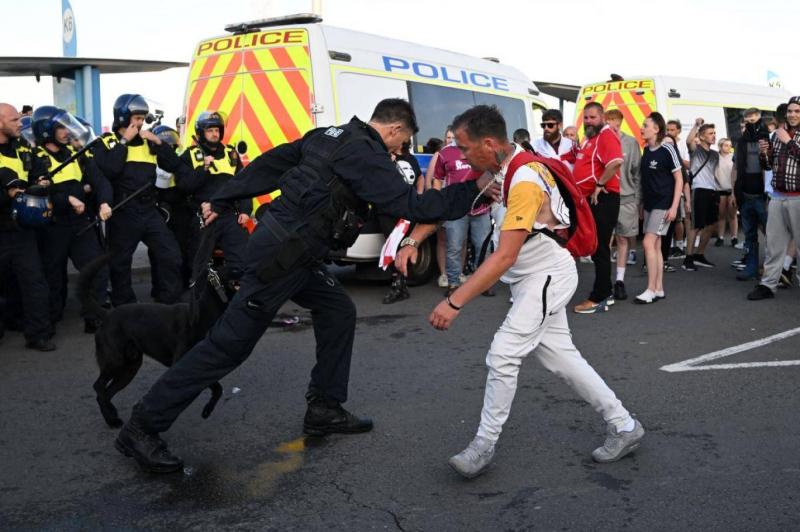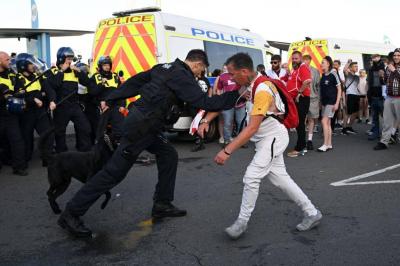Days ago, Elon Musk, owner of the platform "X," described the situation in Britain as the beginnings of a civil war, provoking a flood of comments and responses from officials and the public in the UK. With violence escalating to the point of hundreds being arrested in just one week, and far-right protests spreading to over 23 areas, the question of what is occurring and what awaits the country as the crisis continues both geographically and politically has become legitimate. A spokesperson for Prime Minister Keir Starmer stated that there is "no justification" for Musk's comments, while Justice Minister Heidi Alexander told the BBC that "the American billionaire's comments are completely unwarranted and very unfortunate," noting that Musk will bear the responsibility for his remarks which reached over 192 million people, referred to the number of his followers on the platform previously known as "Twitter" until July 23, 2023.
In response to Musk's tweet, the Prime Minister announced heightened security measures against vandalism or "bullying" threatening the Muslim community in the UK. Musk then remarked on Starmer's statements in a post asking, "Shouldn't you be concerned about the safety of all communities in the nation?" This seemed to imply that the American billionaire supported British far-right protests or had objections to the government's handling of the protests.
Beyond the virtual exchange between Musk and Starmer, there is a fear of an outburst of civil war in the country, especially as demonstrations by the far right have escalated to attacks on mosques, religious institutions, and personal properties belonging to Muslims. Young men from communities, such as in Birmingham, have volunteered to defend against such attacks, and similar actions have been noted around hotels housing migrants who arrived via the English Channel and are awaiting decisions on their refugee and residency applications.
### Terrorism and Islamophobia
Former Counter-Terrorism Police Chief Neil Basu stated that "some acts of violence during the riots have come closer to being classified as terrorism." Basu, who held the position between 2018 and 2021, emphasized the need for his successor and relevant authorities to carefully examine the "legal definition of terrorism" when reviewing some of the events that occurred over the past week, which have terrorized certain segments of British society. The Prime Minister indicated that anyone involved in hostilities would face "the full force of the law," and Starmer announced an army of specialized officers to confront attempts by "bullies" to target Muslims or any other minorities in the country. The Home Office also provided increased protection for mosques under a new rapid response operation designed to quickly address threats of potential attacks on places of worship in the country.
The Islamic Council in Britain praised the government's new plan to defend minorities, which has allocated approximately £30 million, allowing local councils to request urgent protection for places of worship, schools, and properties in immigrant communities in the UK. The council also stated that "the police are doing their utmost, and their members are at risk in defense of all communities." The council urged members of the Muslim community to cooperate with the police and maintain communication with them to report any attacks on properties and personal belongings. Meanwhile, Labour MP Afzal Khan called on the government to provide an official definition of "Islamophobia" and to create strict measures and laws to combat it, stating that "ignoring this issue over the past years is what led the country to a clear animosity towards Muslims, which extremist right groups are exploiting today."
### Legal Confrontation
The British government's new measures to tackle assaults and the "bullying" of the far-right extend beyond security power and the reinforcement of police officers and tools in the streets. The government amended some laws to bring vandals and instigators of violence to court, issuing penalties, including fines or imprisonment for varying durations depending on the crime and damage committed. In a conversation with "Independent Arabic," comparative law professor at Middlesex University Nihad Khnefer stated that "criminal penalties will serve as a deterrent for many who engage in riots and assaults on the streets, whether towards individuals or property. However, this increase in penalties could result in more criminals in prisons and elevate the burdens on correctional institutions that have already reached maximum capacity before the crisis."
In a non-security confrontation, the government also decided to halt far-right propaganda related to their protests on social media platforms. They sought to create laws punishing those who promote violence against migrants on these platforms, as well as working to penalize the dissemination of false information, similar to what happened when millions of accounts on "X" circulated a false name of a child offender in Southport that sparked outrage among Britons. Interior Minister Yvette Cooper added that the government met with officials and leaders of social media platforms in London, urging them to take responsibility in countering misinformation and hate incitement within the UK. Cooper also noted that Ofcom, the regulatory authority for online content, is accelerating the completion of regulations related to the Online Safety Bill passed last year under the Conservative government.
### The Political Aspect
The legal and security measures the government is taking against the far-right protests seem insufficient from the perspective of some politicians affiliated with this movement, who do not necessarily represent "populists" but who are raising their voices alongside those participating peacefully in today's protests, calling for the government to implement real measures to halt immigration and adopt "policies that restore their sense of security and safety in their country." Among these is Labour MP Sarah Edwards from Tamworth, who stated that residents of her constituency have repeatedly expressed their desire to clear hotels of illegal migrants and take official measures to resolve the prolonged immigration crisis.
Former Conservative MP Jacob Rees-Mogg also stated that the "Labour" government should heed the demonstrators' calls to halt immigration, emphasizing that "we shouldn't label all protesters as 'bullies'; rather, Starmer and his ministers should search for genuine solutions to the issues raised by those agitated in the streets regarding the rising number of migrants in the UK to unprecedented levels and the poor integration of some migrant groups into British society."
MPs from both the Conservative and Reform parties have called on the Prime Minister to summon the London Parliament to convene and cut the summer recess for deputies to discuss the crisis and seek resolutions. However, Starmer rejected these calls, stating that "his government is focused on addressing the problem and its implications," while political researcher Jasmine Clare explained to "Independent Arabic" that "Starmer prefers not to open up a front against his government under the dome of the House of Commons, by giving right-wing MPs the opportunity to attack the government and its ministers on several issues stemming from current events."
Between the political and security dimensions of the current events, the populist right crisis in Britain is growing like a snowball, and with the widening protests and acts of violence, the likelihood of clashes between native residents and migrants increases, potentially turning into a civil war, which would be the fourth if it occurs, nearly 400 years after three such wars occurred between 1631 and 1652, with today's warring parties differing significantly from those events in the distant past.




